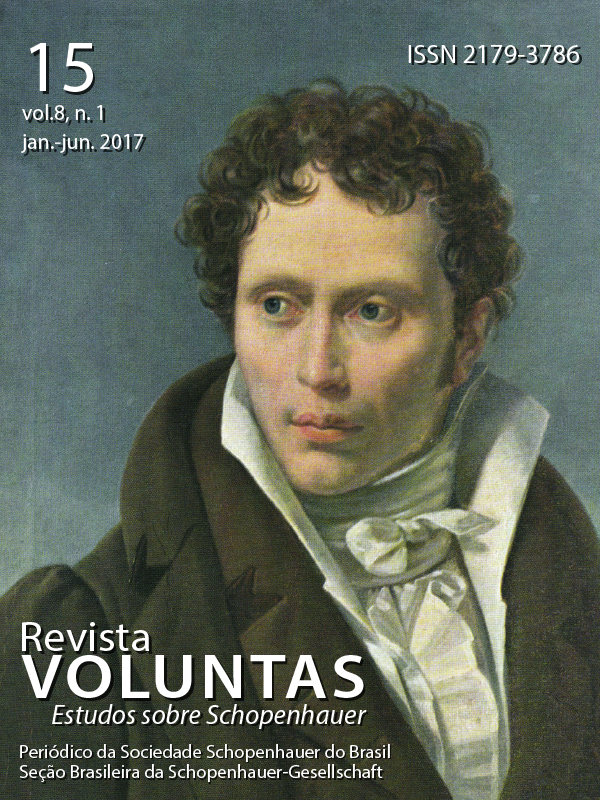Schopenhauerian influences in young Horkheimer’s “Sehnsucht”
DOI:
https://doi.org/10.5902/2179378633732Keywords:
Horkheimer, Schopenhauer, Sehnsucht, Nostalgia, Frankfurt SchoolAbstract
The purpose of this paper is to examine Schopenhauer’s influence in young Max Horkheimer’s writings: “Aus der Pubertät” and “Dämmerung”: Notizen in Deutschland, 1926-1931. These works contain the description of a significant interior attitude that characterizes throughout the german Romanticism: the Sehnsucht, a longing between a past’s nostalgia and a happiness craving. Horkheimer had read Schopenhauer’s writings in this interior mood. Schopenhauer's pessimism had helped Horkheimer to demystify reality and history and therefore it had represented his whole thought’s background. Furthermore this influence had shaped his reception of previous and contemporary philosophies’ assumptions, in particular Marxism and Idealism. The focus on the pessimistic-schopenhauerian background is essential to find out his inspiring imprints of the whole Frankfurt School’s thinking.
Downloads
References
ADORNO, T. W. In Empirische Sozialforschung, Wissenschaftliche Schriftenreihe des Instituts zur Förderung öffentlicher fini. Angelegenheiten Zur gegenwärtigen Stellung der empirischen
Sozilaforschung in Deutschland; e V., Bd. XIV, Frankfurt a. M., 1952.
BEDESCHI, G. Introduzione alla Scuola di Francoforte. Roma-Bari: Editori Laterza, 2005.
BEMJAMIN, W. Berliner Kindheit um neunzehnhundert. Trad. it. Torino: Einaudi, 1973.
BETTINI, F. Teorie letterarie nella Scuola di Francoforte. Roma: Savelli, 1976.
CENTRO INTERDIPARTIMENTALE DI RICERCA SU ARTHUR SCHOPENHAUER E LA SUA SCUOLAdell’Università del Salento (a cura di). La scuola di Schopenhauer: testi e contesti. Lecce: Pensa
Multimedia, 2009.
CIRACÌ, F. Il mondo come volontà, idee e rappresentazione. Per una possibile lettura in senso illuministico della dottrina delle idee. Revista Voluntas: estudos sobre Schopenhauer, Rio de Janeiro, I sem. 2010, vol. 1, n. 1, pp. 71-115.
DONAGGIO, E. La scuola di Francoforte, la storia e i testi. Torino: Einaudi, 2005.
FROMM, E. La crisi della psicanalisi. Milano: Mondadori, 1971.
GALEAZZI, U. La scuola di Francoforte: teoria e critica in nome dell'uomo. Roma: Città nuova, 1975.
GENINAZZI, L. Horkheimer & Co. Gli intellettuali disorganici. Milano: Jaca Book, 1977.
HESSE, H. Demian. Milano: Oscar Mondadori Moderni, 2007.
HORKHEIMER, M.; ADORNO, T. W. Lezioni di sociologia, Istituto per la ricerca sociale di Francoforte. Torino: Einaudi, 1966.
HORKHEIMER, M. Aus der Pubertät. Novellen und Tagebuchblätter. München, 1974.
HORKHEIMER, M. Crepuscolo. Appunti presi in Germania, 1926-1930. Trad. it. di G. Backhaus. Torino, 1977.
HORKHEIMER, M. La nostalgia del totalmente Altro. Trad. it. Querianiana. Brescia, 2001.
HORKHEIMER, M. Studi di filosofia della società. A cura di Werner Brede. Torino: Einaudi, 1981.
HORKHEIMER, M. Taccuini 1950-1969. Genova: Marietti, 1988.
HORKHEIMER, M. Teoria critica. 2 voll. Trad.it. di G. Backhaus. Torino, 1974.
MANN, T. Tönio Kroger, La morte a Venezia, Tristano. Milano: Feltrinelli, 1965.
NIETZSCHE, F. Schopenhauer educatore. Trad. it di V. Arangio-Ruiz. Milano: All'insegna del pesce d'oro, 1973.
PONSETTO, A. Max Horkheimer, dalla distruzione del mito al mito della distruzione. Bologna: Il Mulino, 1981.
RICONDA, G. In Romanticismo, Esistenzialismo e Ontologia della libertà, Horkheimer e Schopenhauer. Milano: U. Mursia, 1979.
ROSEN, Z. Max Horkheimer. München: C. H. Beck, 1995.
RUSCONI, G. E. La scuola di Francoforte, origini e significato attuale. Bari: De Donato, 1972.
SCHMIDT, A. Zur Idee der Kritischen Theorie, Elemente der Philosophie Max Horkheimer. München, 1974.
SCHOPENHAUER, A. Il mondo come volontà e rappresentazione. Trad. it. S. Giametta. Milano: BUR Biblioteca Univ. Rizzoli, 2002.
SCHOPENHAUER, A. Parerga e paralipomena. A cura di G. Colli. Milano: Adelphi, 1981.
VINCIERI, P. Discordia e destino in Schopenhauer. Genova: Il Melangolo, 1993.
WIGGERSHAUS, R. La Scuola di Francoforte. Storia. Sviluppo teorico. Significato politico. Torino: Bollati Boringhieri, 1992.
Downloads
Published
How to Cite
Issue
Section
License
The submission of original manuscripts to this journal implies the transference, by the authors, of the copyrights for printed and digital publication. The copyrights of a published manuscript belong ultimately to the author, and only the copyright for its first publication is reserved to the journal. Authors may only use the same results in other publications explicitly indicating this journal as the medium of the original publication.
Licence
Attribution-NonCommercial-ShareAlike 4.0 International (CC BY-NC-SA 4.0) - This license lets others remix, tweak, and build upon your work non-commercially, as long as they credit you and license their new creations under the identical terms.






